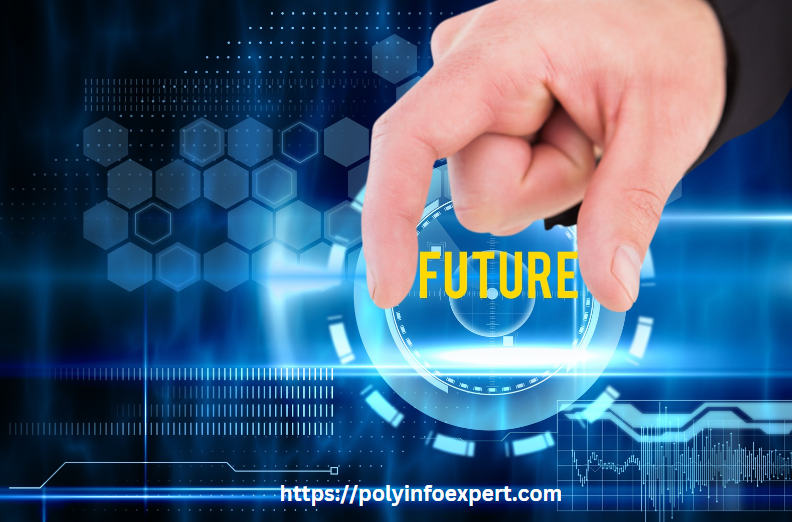Sixteen New Technological Developments In 2024: Top-Paying Jobs in the Highest-Paid Companies
Technological developments are accelerating at a never-before-seen pace in today’s rapidly changing world, thanks to quick breakthroughs. This fast evolution includes fundamental changes that are changing the duties of IT professionals, in addition to new technologies and technological trends. To be competitive and relevant in the rapidly approaching contactless future, IT professionals in 2024 must adopt a never-ending cycle of learning, unlearning, and relearning.
For anyone looking for the top-paying jobs in the world, the highest-paid companies must remain up-to-date on new developments in technology and market trends. This proactive method entails projecting future skill needs and creating a plan for obtaining them. Here are 16 important new technology trends to watch in 2024 to help you navigate this changing terrain and open your prospects for profitable tech jobs. First, let’s talk about the highly talked-about topic of generative AI, or gen-AI, which is predicted to revolutionize several industries and companies.
Sixteen New Technological Developments In 2024
Generative-AI:
Advanced artificial intelligence, known as “Generative AI,” is particularly good at creative activities and can generate original content on its own, including literature, music, and graphics. In contrast to conventional AI, which concentrates on making decisions and solving problems, generative AI employs deep learning methods to identify patterns in data and produce original results. By producing content that is frequently identical to human-generated content, it might imitate human ingenuity. With its newfound potential for automated creativity and exploration, generative AI is spurring innovation in industries such as design, content development, and the arts.
After mastering Generative AI, you can work in high-demand roles across high-ranked companies as a:
- Generative-AI Research Assistant
- Data Scientist
- AI Ethics Consultant
- Academic Researcher
- Generative-AI Fashion Designer
- Creative Technologist
Digital Trust:
Digital trust is the belief and reliance on the security, integrity, and privacy of digital interactions, data, and transactions. It encompasses trust among persons, organizations, and systems in the digital ecosystem, assuring openness, accountability, and ethical behavior. Cybersecurity measures, data protection policies, authentication mechanisms, and regulatory compliance all contribute to the foundation of digital trust. Establishing and maintaining digital trust is critical for building positive relationships, reducing risks, and providing seamless and secure digital experiences. It is crucial for accelerating digital transformation, innovation, and collaboration across businesses and sectors.
- Digital Forensics Investigator
- Cybersecurity Analyst
- Identity and Access Management (IAM) Specialist
- Blockchain Security Engineer
- Digital Trust Consultant
- Data Privacy Officer
Artificial Intelligence (AI) and Machine Learning (ML):
Artificial intelligence (AI) is the simulation of human intellect in computers, allowing them to carry out activities like learning, problem-solving, and decision-making that normally require human intelligence. A branch of artificial intelligence called machine learning (ML) aims to teach computers how to see patterns in data, draw conclusions, and make predictions or judgments without the need for explicit programming. Applications like speech recognition, picture categorization, and customized recommendations are made possible by machine learning (ML) algorithms, which get better over time by analyzing data and modifying their behavior.
AI drives breakthroughs in automation and intelligent systems by encompassing a wider variety of skills, such as machine learning, natural language processing, robotics, and computer vision. These technologies are improving productivity, accuracy, and creativity in a variety of industries, including manufacturing, entertainment, healthcare, and finance. There are the following jobs after learning artificial intelligence (AI) and machine learning (ML):
- Machine Learning Engineer
- ML operations Engineer (MLops)
- Data Engineer
- AI solution architect
- Deep Learning Engineer
- AI content creator and Game Developer
Computing Power:
Computing power is the capacity of a computer or computing system to effectively process data and carry out intricate computations. Processing speed, memory size, and parallel processing capacity are frequently used to quantify it. Computing power is the measure of how quickly and efficiently a task may be completed, including executing software, analyzing data, and conducting simulations. More memory storage, faster processors, and parallel computing architectures are examples of technological advancements that have improved computing power and made more complex computer jobs possible. Improving performance, scalability, and innovation in a variety of fields, such as business analytics, artificial intelligence, and science research, depends on the efficient use of computing power.
- High-performance Computing (HPC) Engineer
- Quantum Computing Researcher
- Parallel Computing Specialist
- Cloud computing Architect
- Edge computing Solutions Engineer
- Computational Scientist
Robotics Process Automation (RPA):
Robotic Process Automation (RPA) is the use of software robots (or “bots”) to automate repetitive operations and workflows within corporate processes. These bots may imitate human behavior by engaging with digital systems, apps, and data sources. RPA automates routine tasks such as data entry, form filling, and report preparation in order to streamline operations, increase productivity, and eliminate human error. It does not require any changes to existing IT infrastructure and may operate across various systems, making it a cost-effective and scalable automation solution. RPA is frequently utilized in areas such as banking, healthcare, and manufacturing to increase efficiency and flexibility.
- RPA Developer
- RPA Business Analyst
- RPA Process Consultant
- RPA Architect
- RPA Quality Assurance (QA) Specialist
- RPA Infrastructure Engineer
Quantum Computing:
Quantum computing uses quantum physics concepts to conduct computations with quantum bits, or qubits, that can represent several states at the same time. This enables quantum computers to solve complicated problems far faster than traditional computers. Quantum computing has the potential to revolutionize industries such as cryptography, drug discovery, and optimization by addressing tasks that are beyond the capabilities of regular computers. Its unique character allows for parallel processing and the exploration of huge solution spaces, opening up new avenues for scientific and technological growth. However, quantum computing is still in its early phases, with ongoing research addressing issues such as qubit stability and error correction.
- Quantum Software Developer
- Quantum Machine Learning Specialist
- Quantum Computing Ethics Advisor
- Quantum Cryptographer
- Quantum Hardware Engineer
- Quantum Computing Research Scientist
3-D Printing:
3D printing, also known as additive manufacturing, is the process of building three-dimensional objects layer by layer using digital models. It entails employing materials such as plastics, metals, and ceramics to create real items using computer-aided design (CAD) files. 3D printing enables customization, rapid prototyping, and low-cost production, revolutionizing industries such as healthcare, aerospace, and manufacturing. It allows for the production of complex geometries, detailed designs, and working prototypes with great precision and detail. As technology progresses, 3D printing’s uses grow to encompass bioprinting, construction, and sustainable manufacturing methods.
- 3-D Printing Engineer
- Emulation Prototyping Engineer
- 3-D Modeler
- Fashion Tech Designer
- Space Exploration Engineer
- Bioprinting Specialist
Edge Computing:
Cloud computing, formerly considered a fresh technology trend to watch, has become mainstream, with major firms such as AWS (Amazon Web Services), Microsoft Azure, and Google Cloud Platform dominating the market.
Edge computing is a decentralized computing paradigm in which data processing and storage are moved closer to the point of data generation, such as IoT devices or sensors. This decreases latency and bandwidth utilization by processing data locally, resulting in better real-time response and efficiency. Edge computing allows for speedier decision-making, supports applications with minimal latency, and decreases reliance on centralized data centers. It’s suitable for applications like self-driving cars, smart cities, and industrial automation that require real-time processing. Edge computing complements cloud computing by extending computing capabilities to the network edge, thereby improving scalability and performance.
- Internet of Things (IoT) Edge Developer
- Edge Cloud Engineer
- Edge Security Specialist
- Edge DevOps Engineer
- Cloud Infrastructure Specialist
- Cloud Architect and Security Architect
Genomics:
Genomics is the study of an organism’s full DNA sequence, including all of its genes. It entails studying the structure, function, and interactions of genes in order to comprehend genetic variations, inheritance, and biological processes. Genomics, when combined with advanced technology such as DNA sequencing and bioinformatics, enables a full investigation of an organism’s genetic makeup. Genomic research reveals information on genetic variants, gene functions, and evolutionary relationships using high-throughput sequencing techniques.
Bioinformatics tools handle and interpret massive volumes of genomic data, allowing researchers to investigate complicated biological processes and diseases. The combination of genomes and technology drives advances in personalized health, precision agriculture, and conservation biology. Finally, genomics technology enables scientists to unravel the secrets of life at the molecular level, resulting in innovation and achievements across multiple domains.
- Clinical Geneticist
- Pharmacogenomics Specialist
- Bioinformatics Analyst
- Genomic Data Scientist
- Genomic Researcher
- Genomic Epidemiologist
Blockchain:
Blockchain technology is a decentralized digital ledger that securely and transparently records transactions across numerous computers. It uses cryptographic approaches to assure data integrity, immutability, and consensus among network participants. Each transaction is divided into blocks and linked in a chronological chain, resulting in a tamper-proof record of occurrences. Blockchain provides trustless peer-to-peer transactions, smart contracts, and decentralized apps (DApps), transforming industries such as finance, supply chain management, and healthcare through increased security and efficiency.
- Blockchain Developer
- Cryptocurrency Analyst
- Blockchain Security Engineer
- Project Manager
- Blockchain Architect
- Blockchain Innovation Engineer
5G Technology:
The fifth generation of mobile network technology, or 5G, offers better capacity, lower latency, and noticeably quicker data speeds than earlier generations. It uses cutting-edge technology to provide improved performance and connection, including large MIMO (Multiple Input Multiple Output), millimeter-wave spectrum, and network slicing. Internet of Things (IoT) gadgets, ultra-high-definition streaming, virtual and augmented reality apps, and real-time communication services can all be seamlessly connected with 5G. Its enhanced connectedness and efficiency
Almost all telecommunications companies, including QualComm, Apple, Tmobile, Verizon, and Nokia Corp., are now developing 5G applications. By the end of 2027, there will be 4.4 billion 5G Network subscribers, making it a
- 5G Network Engineer
- 5G IoT Solutions Engineer
- Cloud Services Manager
- Business Development Manager
- Security Specialist
- 5G Policy and Regulations Analyst
Cyber Security:
Cybersecurity technology is the collection of instruments, procedures, and defenses against cyberattacks that are used to safeguard data, networks, and digital systems. To protect against malware, illegal access, and data breaches, it consists of technologies like firewalls, multi-factor authentication (MFA), intrusion detection systems (IDS), and encryption. To successfully detect and respond to cyberattacks, cybersecurity technology also includes threat intelligence, security monitoring, and incident response capabilities. Cybersecurity technology is always changing in tandem with cyber threats, utilizing cutting-edge methods such as artificial intelligence (AI) and machine learning to improve defenses. In the end, cybersecurity technology is essential for guaranteeing the availability, confidentiality, and integrity of digital assets and data.
- Security Operation Center (SOC) Analyst
- Ethical Hacker
- Cyber security Analyst
- Identity and Access (IAM) Specialist
- Malware Analyst
- Incident Response Manager
Metaverse Technology:
Metaverse technology is the term for immersive digital environments that combine the virtual and real worlds, enabling real-time user interaction with both digital items and other users. Virtual worlds, augmented reality (AR), virtual reality (VR), and mixed reality (MR) experiences are all included, and they’re frequently connected via a common web platform. Users can create avatars, interact with others, work together, and take part in a variety of activities like gaming, learning, entertainment, and business thanks to metaverse technology. With its smooth and connected virtual world that allows users to create, explore, and engage in new ways, it’s reshaping the landscape of digital experiences in the future.
- Metaverse Developer
- Virtual Reality (VR) Analyst
- Augmented Reality (AR) Designer
- Metaverse UX/UI Designer
- Metaverse Security Specialist
- Virtual Event Coordinator
DevOps:
Software development (Dev) and IT operations (Ops) are combined in DevOps technology, which automates procedures and improves teamwork. To speed up software development and deployment, it incorporates tools and processes for infrastructure as code (IaC), continuous integration, and delivery. DevOps attempts to eliminate silos between development and operations teams to increase efficiency, agility, and collaboration. To provide software more quickly and reliably, it places a strong emphasis on automation, monitoring, and feedback loops. In the end, DevOps technology makes it possible for businesses to deliver high-quality software products and services more successfully.
- DevOps Engineer
- Cloud DevOps Engineer
- Site Reliability Engineer (SRE)
- DevOps Architect
- Continuous Integration/Continuous Delivery (CI/CD) Specialist
- DevOps Automation Engineer
New Energy Solutions:
The term “new energy solutions technology” describes creative methods and developments in energy efficiency, grid management, energy storage, and renewable energy sources. It encompasses technology like energy management software, smart grids, solar panels, wind turbines, and battery storage systems. These strategies seek to lessen dependency on fossil fuels, lessen their negative effects on the environment, and advance renewable energy methods. In order to facilitate the shift to greener and more resilient energy ecosystems, new energy solutions technology also includes advancements in electric cars, smart buildings, and decentralized energy systems. All things considered, it propels the energy industry’s transition to decarbonization, sustainability, and energy independence.
- Renewable Energy Engineer (Solar, Hydro-power, Thermal, etc.)
- Energy Storage Specialist
- Smart Grid Analyst
- Decentralized Energy System Engineer
- Project Manager
- Sustainability Manager
Datafication:
The term “datafication technology” describes the method of turning different facets of daily life and activity into digital data. Data from various sources, including sensors, gadgets, social media, and internet platforms, must be gathered, analyzed, and utilized. Decision-making and innovation across industries are fueled by datafication, which makes it possible to translate information into insightful analyses, forecasts, and actions. It is the foundation for technologies that derive value and meaning from data, such as artificial intelligence (AI), machine learning, and big data analytics. Data-driven strategies and digital transformation are being fostered by datafication, changing how individuals, governments, and organizations engage with data.
- Robotics Engineer
- Big Data Engineer
- Business Intelligence (BI) Consultant
- IoT Data Analyst
- Data Visualization Specialist
- Chief Data Officer (CDO)
Please contact us https://polyinfoexpert.com/how-to-write-an-attention-grabbing-resume-tips-and-guidelines/ for more information related to technology.


